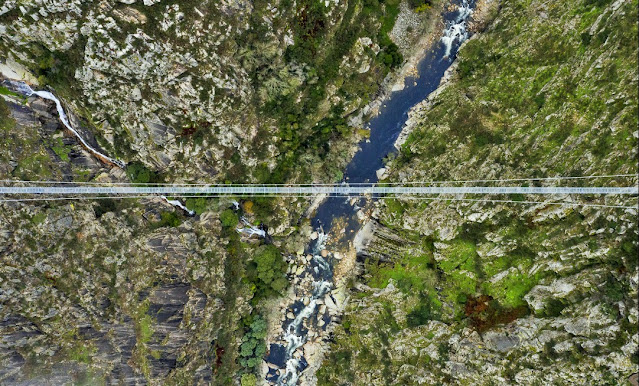
PAIVA WALKWAYS
40° 57′ 10,33″ N, 8° 10′ 36,69″ W
The Paiva Walkways are a series of wooden pedestrian walkways across the Paiva River, in Arouca. The walkways are around 8.7 kilometers long, with the construction of a further 12 kilometers planned. They were built along the left bank of the Paiva River, in the Douro River basin, between the Espiunca bridge and the Areinho river beach, thus covering the area known as the Garganta do Paiva, being one of the elements of the Arouca Geopark. Located an hour away from Porto, the Passadiços do Paiva allow you to escape the reality of the urban space of the city of Porto and enter a scene straight out of a movie. In August 2017, following its success, the construction of a 480-meter pedestrian bridge over the Paiva River was awarded, with a budget of around 1.7 million euros, whose transparent floor (built with a super metallic mesh) -resistant) will be suspended 150 meters high, 1.20 meters wide throughout, supported by just two cables connecting both banks of the river in the Garganta do Paiva area, allowing you to appreciate the Aguieiras waterfall and the monumental staircase of Passadiços do Paiva from a higher elevation. However, there was immediate criticism from environmental movements due to the possibility of the transparent bridge resulting in an instrument for "mass tourism" harmful to local biodiversity.
The Passadiços do Paiva, on September 4, 2016, were chosen as the most innovative tourist project in Europe, in the 2016 edition of the World Travel Awards, in the category of Leading Tourist Development Project in Europe, considered the Oscars of Tourism worldwide . For the second year in a row, the 'Passadiços do Paiva' equipment won the award for 'Best tourism development project in Europe', in a ceremony that took place on September 30, 2017 in Saint Petersburg, Russia.
In 2018, for the third consecutive time, Passadiços do Paiva won, in Greece, these so-called Tourism "Oscars" for Best European Tourism Development Project and also Best European Adventure Tourism Attraction.
Having applied for Passadiços do Paiva, the Municipality of Arouca (municipality with a strong socio-economic connection to the urban space of Porto, in addition to territorial proximity, given that the border of São Miguel do Mato (Arouca) with Gondomar is approximately 20 km from the city of Porto) won the «Municipality of the Year 2016» award, in the «Porto Metropolitan Area» category, in the third edition of the «Municipality of the Year» awards, which are an organization of UM-Cidades (University of Minho), which aims to reward good practices, based on projects with significant impacts on the territory, economy and society, and which promote growth, inclusion and sustainability.
The route takes place under a pine wood structure treated with Koppers MicroPro, anchored in iron to the rock mass, requiring some regulatory precautions and safety measures to follow.
The walkway also includes sections of steps and some sections on dry land.
Along the route there are explanatory and informative panels regarding natural references such as the Aguieira waterfall and the river's strongest rapids, such as the so-called 'Rápido Grande', 100 meters long with an accelerated current, and the 'Rápido das Marmitas', 50 meters.
The route stretches between the river beaches of Areinho and Espiunca, with Vau beach in between. Along the route, you can observe various types of wild species in the surrounding environment.

http://www.passadicosdopaiva.pt/en

Águeda;
Aguada de Baixo;
Albergaria-a-Velha;
Alvarenga + Paradinha;
Anadia;
Arões + Trebilhadouro;
Arouca + Meitriz;
Arouca Unesco Global Geopark;
Avanca;
AVEIRO;
Bussaco;
Castelo de Paiva;
Cortegaça;
Costa Nova;
Covelo de Paivó + Janarde + Drave;
Curia;
Esmoriz;
Estarreja;
Espinho;
Fábrica da Vista Alegre;
Freita Mountain (Serra da Freita);
Ílhavo;
Mealhada;
Murtosa;
Oliveira de Azeméis;
Oliveira do Bairro;
Ovar;
Palhaça (Aveiro);
Paramos;
Pateira de Fermentelos;
Praia da Barra;
Praia da Vagueira;
Ria de Aveiro;
Salreu;
Sangalhos;
Santa Maria da Feira;
São João da Madeira;
Sever do Vouga;
Silvalde;
Sosa (Vagos);
Vagos;
Vale de Cambra;
Válega;























